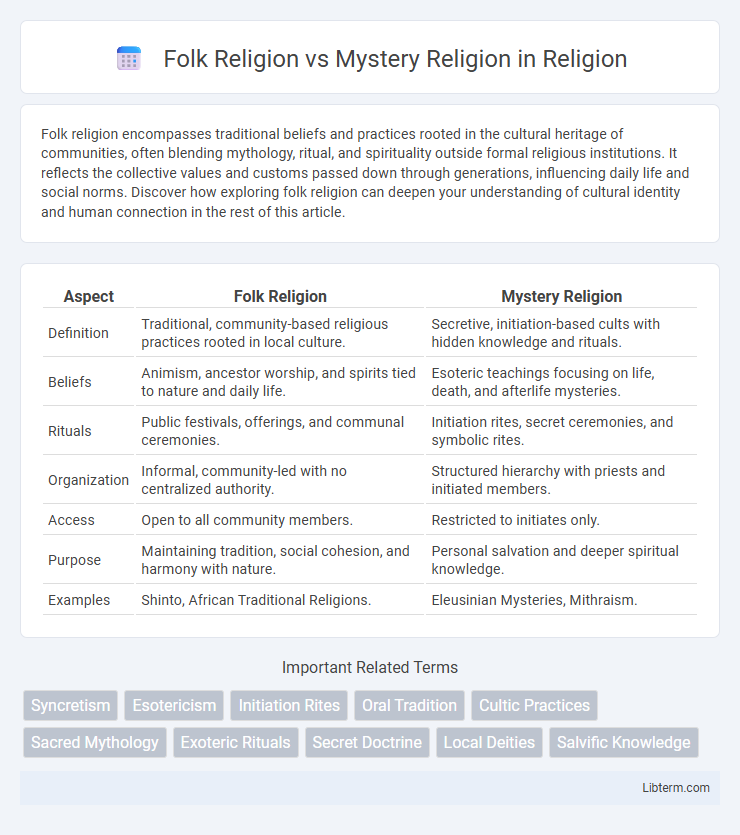Folk religion encompasses traditional beliefs and practices rooted in the cultural heritage of communities, often blending mythology, ritual, and spirituality outside formal religious institutions. It reflects the collective values and customs passed down through generations, influencing daily life and social norms. Discover how exploring folk religion can deepen your understanding of cultural identity and human connection in the rest of this article.
Table of Comparison
| Aspect | Folk Religion | Mystery Religion |
|---|---|---|
| Definition | Traditional, community-based religious practices rooted in local culture. | Secretive, initiation-based cults with hidden knowledge and rituals. |
| Beliefs | Animism, ancestor worship, and spirits tied to nature and daily life. | Esoteric teachings focusing on life, death, and afterlife mysteries. |
| Rituals | Public festivals, offerings, and communal ceremonies. | Initiation rites, secret ceremonies, and symbolic rites. |
| Organization | Informal, community-led with no centralized authority. | Structured hierarchy with priests and initiated members. |
| Access | Open to all community members. | Restricted to initiates only. |
| Purpose | Maintaining tradition, social cohesion, and harmony with nature. | Personal salvation and deeper spiritual knowledge. |
| Examples | Shinto, African Traditional Religions. | Eleusinian Mysteries, Mithraism. |
Defining Folk Religion and Mystery Religion
Folk religion encompasses traditional beliefs and practices rooted in local culture, often involving rituals, festivals, and supernatural beings that address everyday life and communal identity. Mystery religion refers to ancient secret cults that offered initiates esoteric knowledge, personal salvation, and rituals promising an afterlife, typically encoded within mythological frameworks. Both serve spiritual functions but differ in accessibility, with folk religion being communal and public, while mystery religion emphasizes secrecy and initiation.
Historical Origins and Development
Folk religion primarily originates from indigenous traditions and local customs that evolve organically within communities, often predating organized religious systems. Mystery religions emerged in the Greco-Roman world between the 1st millennium BCE and 1st century CE, characterized by secret rites and initiations focused on personal salvation and esoteric knowledge. Both religious forms influenced the religious landscape, with folk religions maintaining continuity through oral traditions and community rituals, whereas mystery religions developed structured mythologies and cultic practices that spread through Hellenistic trade and conquest.
Core Beliefs and Practices
Folk religion centers on community-based traditions, ancestor worship, and rituals tied to nature and local deities, emphasizing practical benefits such as protection and fertility. Mystery religions, prominent in the Greco-Roman world, involve secretive initiation rites, personal salvation, and esoteric knowledge, often promising an afterlife or spiritual transformation. Core beliefs in folk religion are communal and pragmatic, while mystery religions focus on individual enlightenment and mystical experiences.
Community and Social Functions
Folk religion centers on local customs, rituals, and community identity, fostering social cohesion through shared ancestral worship and seasonal festivals. Mystery religions emphasize initiation and secret knowledge, creating exclusive groups that offer personal salvation while reinforcing social bonds within the initiated community. Both systems promote social stability but differ in accessibility, with folk religion integrating the whole community and mystery religions fostering close-knit, selective participation.
Rituals and Sacred Spaces
Folk religions emphasize community-centered rituals performed in natural or ancestral sacred spaces such as groves, rivers, and shrines, often involving local deities or spirits. Mystery religions feature elaborate, secretive initiation rituals conducted in designated temples or underground sanctuaries, designed to create personal spiritual experiences and promise esoteric knowledge. Ritual practices in folk religions are typically cyclical and tied to agricultural or seasonal events, while mystery religions stress transformative rites of passage and inner revelation.
Role of Priests and Spiritual Leaders
Folk religion typically features priests and spiritual leaders who act as community intermediaries, performing rituals and maintaining traditions that are closely tied to local customs and ancestral worship. Mystery religions entrust priests with secretive knowledge and initiation rites, emphasizing personal spiritual transformation and exclusive access to sacred mysteries. The role of priests in mystery religions often involves guiding initiates through complex ceremonies, whereas folk religion leaders prioritize communal participation and preservation of inherited practices.
Transmission and Adaptation Over Time
Folk religion typically relies on oral transmission and localized practices, allowing traditions to adapt organically within communities and evolve through generations. Mystery religions, originating in the Hellenistic period, employed secret teachings and initiation rites preserved through selective, often written, transmission that maintained core doctrines while incorporating syncretic elements from different cultures. Over time, folk religions demonstrate flexible adaptation to social changes, whereas mystery religions adapt by integrating diverse rituals to maintain exclusivity and spiritual significance.
Syncretism and Cultural Influence
Folk religion integrates indigenous beliefs and practices often tied to local traditions, emphasizing community rituals and ancestral worship, while mystery religions focus on secretive initiation rites and esoteric knowledge aimed at personal salvation. Syncretism in folk religion emerges through the blending of native customs with dominant religious frameworks, reflecting adaptive cultural influence and social continuity. Mystery religions employ syncretism by merging elements from various religions, creating hybrid cults that transcend cultural boundaries and influence broader spiritual landscapes.
Appeal and Accessibility
Folk religions often appeal through their deep roots in local traditions and community practices, making them highly accessible to everyday people via rituals, festivals, and ancestral worship. Mystery religions attracted adherents by offering secret knowledge and promises of personal salvation, which were accessible mainly through initiation and adherence to esoteric rites. The accessibility of folk religion lies in its integration with daily life, while mystery religions' appeal is linked to exclusive spiritual experiences and transformative mysteries.
Modern Relevance and Transformation
Folk religions continue to shape cultural identities through localized rituals and ancestral worship, adapting to modern contexts by integrating contemporary social values and technology. Mystery religions, rooted in ancient initiation rites and esoteric knowledge, influence modern spiritual movements like neo-paganism and New Age practices by emphasizing personal transformation and secret wisdom. Both religious forms transform in response to globalization and digital communication, fostering new expressions of faith and community in the contemporary world.
Folk Religion Infographic

 libterm.com
libterm.com